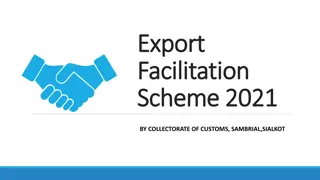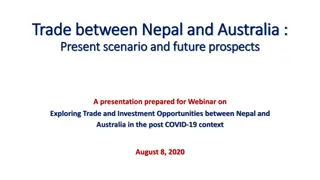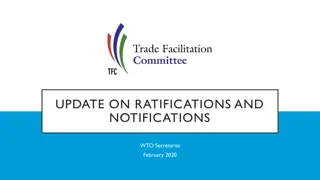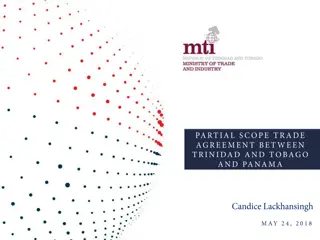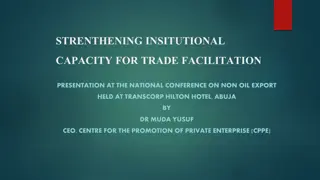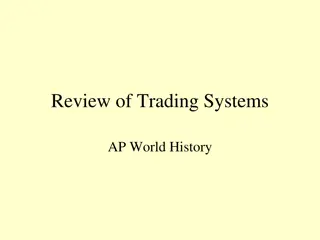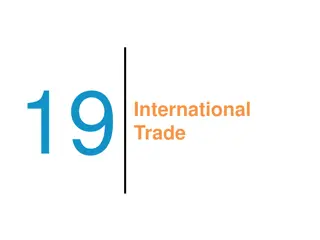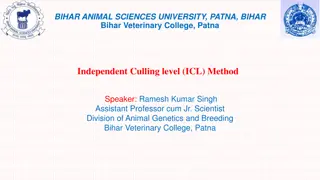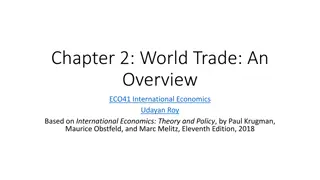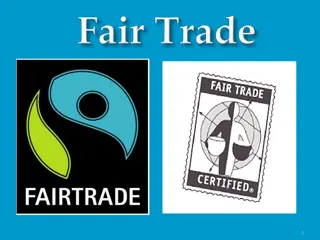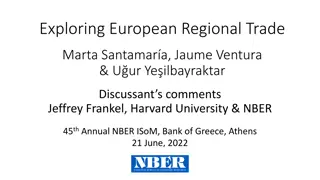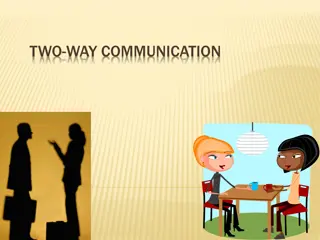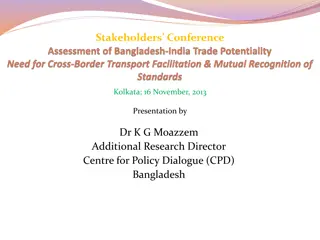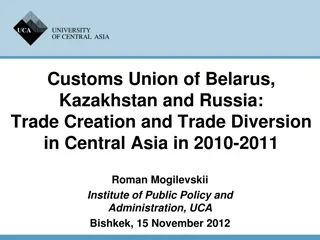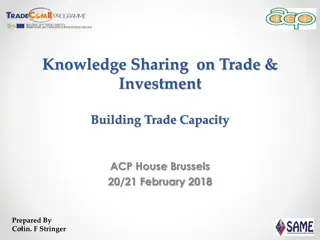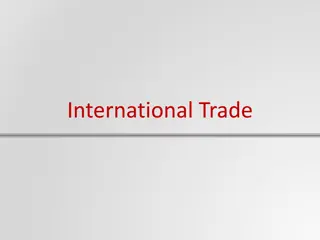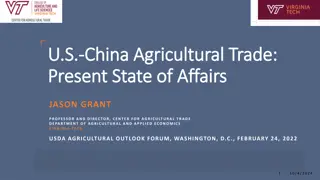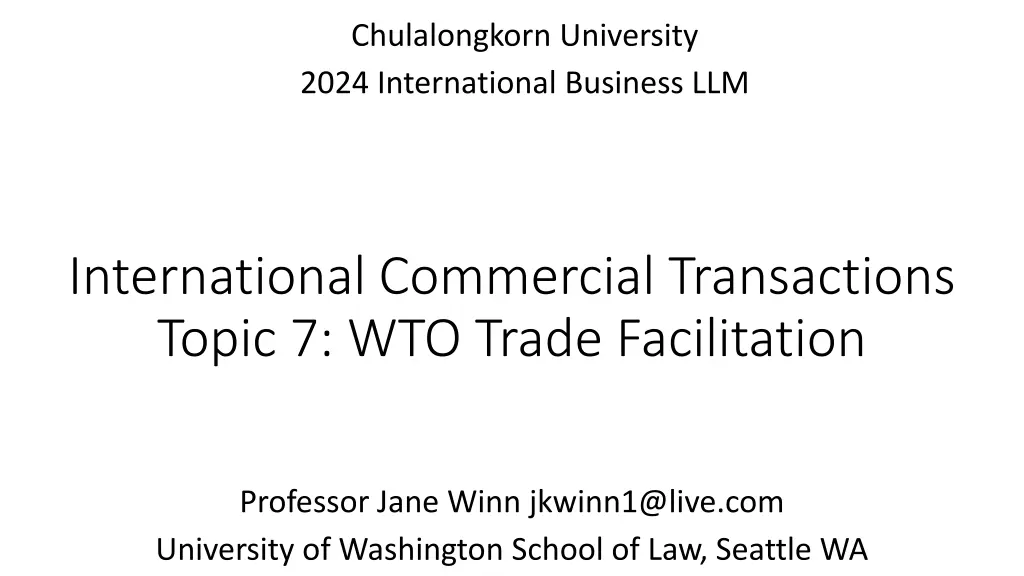
Understanding WTO Trade Facilitation and Its Implications
Dive into the intricacies of WTO Trade Facilitation, exploring the history, challenges, and impact of key agreements like the Bali Agreement. Discover how countries are streamlining import/export processes, enhancing transparency, and fostering global cooperation for efficient trade facilitation.
Download Presentation

Please find below an Image/Link to download the presentation.
The content on the website is provided AS IS for your information and personal use only. It may not be sold, licensed, or shared on other websites without obtaining consent from the author. If you encounter any issues during the download, it is possible that the publisher has removed the file from their server.
You are allowed to download the files provided on this website for personal or commercial use, subject to the condition that they are used lawfully. All files are the property of their respective owners.
The content on the website is provided AS IS for your information and personal use only. It may not be sold, licensed, or shared on other websites without obtaining consent from the author.
E N D
Presentation Transcript
Chulalongkorn University 2024 International Business LLM International Commercial Transactions Topic 7: WTO Trade Facilitation Professor Jane Winn jkwinn1@live.com University of Washington School of Law, Seattle WA
WTO Trade Facilitation 07A WTO TFA fact sheet 2017 07B Modernization Transport Stand Documents 1986 07C Short Course Intl Trade E-Documents 07D Indonesia Trade Facilitation Progress 2012 07E US Maritime Industry CSI Response 2006 07F US DOT National Freight Strategic Plan 2020 07G US National Single Window 07H Thailand National Single Window 07I Short Introduction 3rd Party Logistics 07J 3PL as orchestrator 07K Harding Warehouse receipts for bank loans 07L HBR Pipelines Platforms New Rules 07M You can t impose a culture of innovation 07N UK E-Bill of Lading Legislation 07O Benefits of Replacing EDI with APIs
Review: Failure of Doha Round 2001 Begin work 2003 Cancun, Mexico collapse 2004 Framework Agreement 2005 Hong Kong no progress 2006 Geneva no progress US Congress grants President limited mandate to negotiate treaties in exchange for yes/no vote Fast Track authority expired in 2007 2007 Potsdam no progress 2008 Geneva no progress US, China, India impasse on US farm subsidies 2013 Bali Agreement announced Primary focus on trade facilitation 2014 India blocks adoption until concerns about agricultural subsidies addressed 2017 WTO TFA entered into force after 2/3 WTO members ratified 2021 156 out of 164 WTO members had ratified (not Democratic Republic of the Congo, Haiti, Mauritania, Suriname, Tonga, Venezuela, Yemen)
07A WTO TFA fact sheet 2017 Countries publish specifications for clearing goods for import/export Provide advance rulings (answer specific questions from traders) + appeal Enhance transparency, impartiality of procedures Limit fees and charges Accelerate clearance and release of goods based on World Customs Organization best practices Coordination among border agencies In US around 50 separate government agencies are all arguing with each other Single Window standardization data formats and centralization of all paperwork required for import/export Dashboard is designed from the user perspective Cooperation among customs offices around the world
Progress in building Single Window Nothing, or not yet established Customs only Coordinate with all relevant national government units Public Private Coordination Integrate Logistics with Customs Clearance Integrate Logistics, Trade Finance, Customs Clearance Integrate National and International E-Commerce
07B Modernization Transport Stand Documents 1968 In 1950s, modern containers were invented, standardization efforts began In 1960s, global standards for shipping containers were established, container shipping volume increases exponentially In 1960s, effort began to develop standards for transportation documents to facilitate information sharing and computer processing This document describes effort to computerize exchange of information among trucking companies in the US domestic market, but the problem is the same for all 4 modes of transportation and international markets
07C Short Course Intl Trade E-Documents This is a chapter from a book for a professional training course on trade document processing for employees of banks, shippers, carriers When looking at any computerized information processing system, ask for whom was this optimized? Cross-border trade computer systems were first built to meet accounting and audit purposes, importer-exporter interfaces added afterwards National customs authorities have more power than importers and exporters so externalize the costs of computerization onto them The large computer systems capable of handling Single Window for a whole country may be too expensive for developing economies to afford, so World Customs Organization collaborated with developing economies to develop an open-source software program ASYCUDA to make it easier for them to adopt and maintain such systems Computer security only works in closed environments, in open environments, risk of fraud rises sharply
ASYCUDA Automated System for Customs Data The Automated System for Customs Data (ASYCUDA) designed by the United Nations Conference on Trade and Development (UNCTAD) is an integrated customs management system for international trade and transport operations in a modern automated environment. ASYCUDA provides advanced software applications are designed and developed for customs administrations and the trade community to comply with international standards when fulfilling import, export and transit related procedures. Through ASYCUDA, UNCTAD aims to: Modernizing customs operations and helping to improve revenue collection Facilitating trade efficiency and competitiveness by substantially reducing transaction time and costs Improving security by streamlining procedures of cargo control, transit of goods and clearance of goods Helping fight corruption by enhancing the transparency of transactions Promoting sustainable development by cutting down on the use of paper, through the use of electronic transactions and documents
2024 Countries Participating in ASYCUDA After 40 years, 102 countries participate
07D Indonesia Trade Facilitation Progress 2012 Logistics and trade performance nexus: infrastructure quality is a key performance indicator for economic development So why don t all emerging economies embrace high quality logistics and trade administration systems? Regulatory barriers Protectionism Institutional fragmentation Complex administrative procedures Incomplete infrastructure
07E US Maritime Industry CSI Response 2006 Never let a crisis go to waste Following September 11, 2001 terrorist attacks, US Congress mandated greater security at US ports Customs Trade Partnership Against Terrorism C-TPAT Recognize some freight forwarders and customs brokers and 3PLs as partners of US government in collecting accurate data about imports and importers 4 day advance notice of ships arriving in US 24 hour advance notice of goods being exported to US from the port of shipment
07F US DOT National Freight Strategic Plan 2020 There are lots of people in the US government who know what US needs in terms of logistics and trade administration improvements, but if Congress does not give them money to do it, nothing happens US House of Representatives: elections every 2 years, fund raising and campaigning never ends US Senate: elections every 6 years, more stability and capacity to plan but still not long-term US President: elections every 4 years, with breakdown in party discipline in House and Senate, getting consensus is a much more complex collective action problem Planning versus Strategy Writing a list of everything you want and hoping you will get it is planning Strategy requires making hard choices, taking risks, setting priorities and enforcing them even when they are unpopular Steve Jobs: People think focus means saying yes to the thing you've got to focus on. But that's not what it means at all. It means saying no to the hundred other good ideas that there are. You have to pick carefully. I'm actually as proud of the things we haven't done as the things I have done. Innovation is saying no to 1,000 things.
02V Rumelt Kernel of Good Strategy Kernel Summary Strategy kernel Diagnose the problem What s going on here? In light of information from many sources including that distilled from: Periodic analyses of data from internal controls? Continuous, automated monitoring of internal controls? Guiding policy Hierarchies of objectives Resolving ambiguity Coherent action Andy Grove asked, But what do we DO? U.S. Ambassador (retired) Chas Freeman in July 2024: The US wants to maintain its global primacy and sphere of influence in Asia but no strategy to accomplish this. Increasing military spending is not a strategy. Starting trade wars with trading partners is not a strategy. [Those are plans, not strategies because no goals have been set, no one has said no to anything.]
07G US National Single Window US economy uses computers more, has more advanced companies than most countries so a bad effort by US looks better than a good effort by developing countries US effort to comply with WTO Trade Facilitation Agreement has been slow and incomplete, with costs externalized on trading partners
Internalizing and Externalizing Costs Liability rules can force businesses to internalize costs they would not otherwise voluntarily be willing to pay If price does not reflect the true cost of something (e.g., pollution, worker injuries) then the costs outside the price have been externalized
Lawn Mower Safety: Strict Product Liability Forces Manufacturers to Internalize Safety Costs Safety Bar/Kill Switch on Handle Rear safety flap
How Does Single Window Change Cost Levels and Allocations? In Global South countries, governments cannot collect income taxes/taxing citizens, so they must rely on customs duties/taxing foreigners Employees in ports and Customs can create bottlenecks at the border to restrict imports and exports to extract bribes from foreigners Bribes are equivalent to a facto tax is like a service charge for government services collected from individuals who need government services by individuals providing the services Foreigners internalize the cost of government operations because citizens will not/cannot pay Single Window removes bottlenecks making it harder to collect bribes, forcing Global South countries to try to develop modern tax systems like VAT and income tax to pay for government operations Before local citizens can internalize the costs of running their own government, they need to get concrete economic benefits from trade in the form of higher incomes When every government agency in a country and every country use different procedures, their refusal to develop standard operating procedures and data formats externalizes costs onto anyone who needs government services and must learn to use each separate agencies processes The WCO lowers the cost for Global South countries to adopt standard procedures and data formats with its WCO Data Model and ASYCUDA open source customs automation software When governments internalize the cost of setting standard operating procedures and data format standards, it becomes possible for software developers to sell software to the private sector (write once, run many) Production possibility frontier shifts out = instead of a tradeoff (produce more A, less B or more B, less A) it is possible to get more of both A and B with the same inputs due to technology innovation that increases productivity
Regulation (EU) 2022/2399 established the European Union Single Window Environment for Customs TRADITIONAL DATA APPROACH Customs data is generated for customs purposes and it is separate from commercial data of economic actors Comes from operators (shippers/customs agents etc) not familiar with the contents of consignments Fraudulent/negligent data cannot be penalized because not coming from the source of fraud No cross-verification against other systems Managed mostly on a national basis, so not verifiable with other customs authorities Risk data does not feed into EU systems directly, and is not informing Member States customs on an ongoing basis information sharing is not complete NEW DATA APPROACH Customs data will come from the business systems of authorized economic operators and be based on underlying commercial data Other data will be gathered from other sources (platforms, payment systems, etc) to cross-check anomalies for risk assessments Data will be integrated on common/shared systems, so that all Member States customs can access Penalties/costs applied for fraudulent or negligent data Economies of scale for customs services, and more effective, less variation Benefits at EU and national level in less fraud, better risk management, less unfair competition
Digital and Sustainable Trade Facilitation: Global Report 2023 Based on the United Nations Global Survey on Digital and Sustainable Trade Facilitation
07H Thailand National Single Window For a developing economy, Thailand is doing a very good job of building a National Single Window Public-private partnerships among government agencies, companies and universities
From National Trade Information Silos to National Single Window
Costs & Benefits of Using Standards Benefits of Standardization Reduce costs through simplification of complex processes Reduce learning costs for new producers Allow producers to exploit economies of scale Lower transaction costs between transacting parties Promote market information and confidence by signaling product quality, or compatibility of products or components Reduce compliance costs Increase competition among producers, lower prices to consumers Costs of Standardization Reduced product variety Costs of achieving compliance with standard and obtaining certification of compliance One-time switching costs for established products to comply with subsequent standard Increased switching costs away from obsolete or sub-optimal standard
Technical Standards for Trade Facilitation Under United Nations Economic Commission for Europe founded in 1957, United Nations Centre for Trade Facilitation and Electronic Business (UN/CEFACT) develops standards for trade facilitation. UN/CEFACT Secretariat Diagram
But National Single Windows Not Connected to Other Countries Single Windows Are Still Silos When Viewed from Global Markets
If a Data Silo changes into a Global Platform, what happens?
07I Short Introduction 3rd Party Logistics 07J 3PL as orchestrator Freight forwarders help small importers/exporters to deal with cross- border administrative challenges Compared to domestic commerce, cross-border trade requires 10X paperwork Non-Vehicle Operating Common Carriers in US Customs brokers help importers/exporters to negotiate with national customs officials to get the lowest possible rate of customs duties 3PLs integrate freight forwarder and customer broker function, quote a single price and provide a single, user-friendly interface FedEx, DHL, Kerry, etc. 3PLs own computer systems can convert data from the format required for one data silo to the format required for another data silo
07K Harding Warehouse receipts for bank loans The U.S. central bank/government does not decide which negotiable warehouse receipts are valuable and which are not The U.S. government does provide an optional system for licensing warehouses Lenders know that negotiable warehouse receipts from U.S. licensed warehouses tend to be more valuable than those from warehouses that do not participate in the optional licensing system, so banks charge a lower interest rate due to lower risk In other words, the government can promote economic development best when it provides infrastructure for markets and orchestrates not when it assigns prices US: Let the market lead China: Develop first, regulate second
07L HBR Pipelines Platforms New Rules Platform Ecosystem Orchestration Requires Trust Stakeholder Side One Stakeholder Side Two Platform Owner & Network Services
07M You Cant Impose a Culture of Innovation: Gregory Bateson s 4 Levels of Learning 0 = avoid pain, seek pleasure but no memory 1 = Learning: don t touch a hot stove twice, babies and dogs and cats can learn this way 2 = Learning about learning: awareness of learning as a process administered by someone else, Is this on the exam? Level 2 learning can be mandated and enforced 3 = Learning about learning about learning: evidence-based problem solving Level 3 learning must be voluntary, creativity cannot be mandated and enforced This is the solution to the problem
Continuous Improvement in Engineering Is Based on Philosophy of American Pragmatism Plan-Do-Check-Act Cycle by Walter Shewhart (1891-1967) & Edwards Deming (1900-1993) But How to Police Misconduct without Government? A Public-Private Partnership Is Needed
Other Names for Evidence-Based Problem Solving Statistical process control Continuous improvement Process reengineering Adaptive management Quality management Toyota Way Six Sigma Lean Outcome based assessment Objectives & key results Evidence based practice Project Management Risk management Design Thinking DevOps Agile
What if supplier provides a defective product? ISO 9001:2008 7.4 Purchasing Organization must evaluate and select suppliers based on organization s requirements, records of supplier evaluations must be maintained 4.2.4 Purchasing information: describe product plus procedures, personnel qualifications, quality management system required Purchaser verification of conformity to requirements Normal business practice if defective product discovered Buyer requires a non-conformity report from supplier providing a corrective and preventive action analysis What went wrong? What was done to fix it? (corrective action) What was done to make sure it never happens again (preventive action) If non-conformity report is not acceptable to buyer, then supplier will be disqualified from future business
07N UK E-Bill of Lading Legislation Similar to UNCITRAL Model Law E-Bill of Lading/Electronic Transferable Record only works bilaterally based on contract, it does not create a universally recognized property right until all trading nations have enacted a law like MLETR Some parties will be willing to take the risk of only having a contract right to the goods if they can save enough money/obtain enough other benefits from switching to e-bill of lading
07O Benefits of Replacing EDI with APIs What infrastructure should governments be helping to provide to support the development of globally interoperable Single Windows? Application programming interfaces Can government develop APIs? India is trying this with mixed results Can government command the private sector to develop APIs? Europe has tried this more than once, and it has failed very time Launching a platform through the development of APIs is so complex it requires Bateson Level 3 Thinking to succeed, and that cannot be mandated by government Only the kind of public-private collaboration described by Harding in 1921 can succeed in promoting the development of API standards This requires government to recognize its own limitations What do authors ignore? If EDI takes 4-6 weeks to adopt, it is because someone is using old mainframe computer systems If API takes a few hours or days to adopt, it is because someone is using cloud computing and modular information technology design
What Is the Problem WTO TFA Is Trying to Solve? Single Window Happens Here Import Gov t Export Gov t Buyer s 3PL Seller s 3PL Third Party Logistics Provider Third Party Buyer Seller Logistics Provider B s Bank S s Bank
Digital Networks Are at Risk of Standards Wars Strong positive network externalities make end users want a single network Metcalfe s law explains the benefit Once everyone is on the same network, then lock in to that one unless it is 100% certain everyone will move Lock in creates first mover advantage Huge cost to create networks/digital assets Later unit cost approaches zero Low risk: standards-based strategy creates an open network Lower prices, more choices for consumers Lower profits for lots of producers High risk: proprietary technologies create closed networks Fewer choices for consumers Higher profits for the single winner, everyone else dies
Successful Platform Operator Accelerates the Rise of a Network Economics of Network Effects A network removes barriers to communication among its members after the chicken and egg problem of motivating everyone to join is solved After everyone joins the same network, then they get the positive externality of falling communication costs But if everyone who wants to switch to a new network waits until everyone else acts so no one acts, then they get the negative externality of lock in Economics of Two-Sided Platforms Platform operator must recruit two different sides with two different interests (computer users and software developers, video game players and game developers, mobile phone users and app developers) Platform operator must identify the high commitment side, charge them a high price, then use that value to subsidize the participation of the low commitment side
Costs & Benefits of WTO Trade Facilitation as a Global Platform Costs Fragmentation of Nation Single Window System standards limits scope of automation WCO is very successful at developing consensus standards adopted by all countries but the process is slow and scope is limited Incentives for government service in poor countries often involve illegal relationships, increasing transparency disrupts incentives UK Development Economist Paul Collier case study: 50 customs officials from an African nation spent 3 months in Switzerland working side-by-side 02B ASYCUDA-Newsletter-December-2023 excerpt.pdf suggests more and more countries are moving toward greater transparency Benefits Barriers to competition and innovation reduced Increased data flows and analysis increases the quality of problem solving Administrative burdens on cross-border trade decrease Increased transparency makes increased compliance feasible
Costs & Benefits for Global South of Chinas BRI as Global Trade Facilitation Platform? Costs How much do Global South countries trust China? What if Global South countries lose access to the West as a result of close ties to China? Development aid from the West is likely to decrease in the future as local voters become hostile to immigrants and providing foreign development aid when so many domestic needs remain unmet Benefits Chinese technology has been developed and deployed in situations similar to those in Global South countries, so it is less work to adopt Chinese technology costs less than similar Western technology and qualified Chinese staff are more willing to live in Global South countries to provide support its use It will integrate better into the management of BRI infrastructure projects after they are complete Chinese engagement is not presented as charity or aid but as an bilateral economic relationship that should benefit both sides so should be more certain in the future than aid/charity from the West

